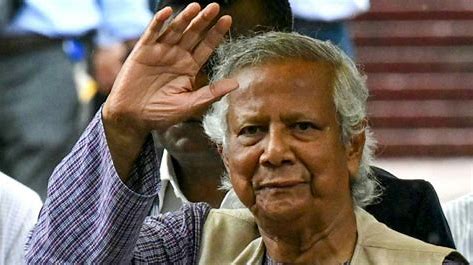In the wake of recent attacks on the Hindu minority following the resignation of Sheikh Hasina as Prime Minister and her subsequent flight to India on August 5, Chief Advisor Muhammad Yunus, leading the interim government, reached out to the affected community on Tuesday. Yunus visited the Dhakeshwari Temple in Dhaka, where he met with Hindu leaders, assuring them of “justice” and “equal rights” for all citizens.
“Rights are equal for everyone. We are all one people with one right. Do not make any distinctions among us. Please assist us. Exercise patience, and later judge — what we were able to do and not do. If we fail, then criticize us,” Yunus declared after his meeting with the community leaders. He emphasized that the administration is committed to creating a secure environment where Hindus and other minorities can live without fear.
Reports from minority organizations indicate that since the fall of the Hasina government, at least five people have died, and there have been 205 incidents of attacks on Hindus across more than 50 districts.
After Yunus was sworn in on August 8, Indian Prime Minister Narendra Modi extended his best wishes, urging Yunus to ensure “the safety and protection of Hindus and all other minority communities.” This statement highlighted Delhi’s expectations from the new leadership in Dhaka.
Yunus stressed the need to transcend religious identities in the pursuit of democracy, stating, “In our democratic aspirations, we should not be seen as Muslims, Hindus, or Buddhists, but as human beings. Our rights should be ensured. The root of all problems lies in the decay of institutional arrangements. That is why such issues arise. Institutional arrangements need to be fixed.” He reiterated the importance of establishing human rights and freedom of speech as the primary goals of his administration.
Addressing the Hindu community directly, Yunus urged them to assert their constitutional rights as citizens of Bangladesh, promising that the government would work to ensure their safety and equality. “You just say you are human, you are citizens of Bangladesh, this is my constitutional right, and you have to ensure it. You just demand this, nothing else… I am here to say we are all equal, there is no scope to create any differences here,” he said.
In response to the ongoing violence, the interim government has established a hotline for reporting attacks on religious institutions, including Hindu temples, churches, and pagodas.
Basudeb Dhar, president of the Bangladesh Puja Udjapan Parishad and a prominent Hindu leader, expressed hope after Yunus’ visit. He said Yunus had assured the community that justice would be served for those affected by the violence and that efforts would be made to protect Hindu temples, businesses, and homes from further attacks.
Dhar, speaking from the Dhakeshwari Temple, noted that the attacks on Hindu establishments began on the evening of August 4 and intensified the following day, affecting over 50 of Bangladesh’s 64 districts. He mentioned that the number of reported incidents is expected to rise as more information comes in.
Despite the widespread violence, there have been positive developments, with some local Muslim groups stepping in to protect Hindu temples, including the Dhakeshwari Temple in Dhaka. Dhar noted that these actions could help restore peace.
While Dhaka has seen some incidents, the majority of attacks have occurred in rural areas, particularly in border regions. A significant factor contributing to the violence has been the absence of police, with many officers abandoning their stations due to fear of reprisals from student protesters. This has left the Hindu community vulnerable, with many unable to file police complaints.
The attacks have deepened the sense of insecurity among Bangladesh’s Hindu population, which makes up about 8% of the country’s 170 million people. With Muslims comprising 91.04% of the population, the remaining 9% includes Hindus (7.95%), Buddhists (0.61%), Christians (0.30%), and others (0.12%), according to the 2022 Census.
The situation also has political undertones, with reports indicating that some Hindu families were targeted due to their perceived political affiliations with the Awami League. Others were attacked by opportunists exploiting the lack of law and order to loot and rob households, while some incidents stemmed from longstanding property disputes.
Community leaders are closely monitoring the situation in the coming weeks and months, with concerns that continued violence could lead to migration to India. “That is a real possibility in the future,” one Hindu leader noted.

